China to launch national carbon trading market 'very soon'
Sign up now: Get insights on Asia's fast-moving developments

China's emissions trading scheme is seen as a key tool to help it reduce its carbon footprint and meet its emission targets.
PHOTO: REUTERS
BEIJING - China's long-awaited national carbon trading market, set to be the world's largest, will be launched very soon and include more than 2,000 power companies in its initial stage, the country's environment ministry said on Wednesday (July 14).
Together, these firms account for about four billion tonnes of carbon dioxide (CO2) emissions annually, said vice-minister of ecology and environment Zhao Yingmin.
The world's largest producer of greenhouse gases, China accounts for 27 per cent of the world's emissions.
In 2019, China's greenhouse gas emissions amounted to some 14.09 billion tonnes of CO2 equivalent, according to figures from the Rhodium Group.
Mr Zhao, who was speaking at a press briefing, said China's long-awaited carbon emissions trading scheme would be launched later this month, but he would not commit to a concrete date when pressed.
"I think we can say that it will officially launch very soon," he said.
Various media reports have said that the national carbon market could begin trading as early as Friday, citing unnamed sources.
China's emissions trading scheme, in the works for a decade now, is seen as a key tool to help the country reduce its carbon footprint and meet its emission targets.
President Xi Jinping has pledged that China would peak carbon emissions before 2030 and attain carbon neutrality by 2060.
The official launch has been delayed repeatedly, partly over concerns of the reliability of emissions data, but there have been seven regional pilot markets, beginning as early as 2013.
China is targeting its power sector first as it emits the most amount of greenhouse gases among its various industries, and about 57 per cent of electricity generated in China last year had come from burning coal.
"So by starting with this industry, we will be able to both reduce pollution and carbon emissions at the same time," said Mr Zhao.
The national market will eventually encompass more industries, including steel and petrochemicals, among others, but Chinese officials have not committed to a firm timeline.
Asked about the price that carbon would trade at, Mr Zhao said it was still premature to say but pointed out that in the seven pilot markets, carbon had traded at between 40 yuan (S$8.40) and 50 yuan a tonne.
This ranks on the lower end of how carbon is priced - in contrast to the European Union's emissions trading scheme that will price carbon at US$49.78 (S$67.50) a tonne, figures from the World Bank show.
Analysts are watching China's carbon market closely. It will cover more than 6 per cent of global emissions and will be the world's largest carbon market, according to the World Bank.
Such carbon markets work by incentivising polluters to reduce emissions by allowing them to trade "permits" that give them the right to emit.
Each year, polluters must turn in or surrender permits equal to the amount of emissions they produce.
Initially, these permits would be allocated for free and would be "pegged" to actual emissions output, said Mr Zhao. But there are also worries that companies could inflate their emission numbers in order to get more permits.
To this, Mr Zhao said companies are subject to multiple levels of checks by the provincial and central governments to verify their data and numbers.
Greenpeace East Asia senior climate policy adviser Li Shuo said Beijing was moving in the right direction by putting a price on carbon with its emissions trading scheme.
But he also cautioned that impact would be limited until the scheme is expanded to other sectors.
"In the short term, moving away from its infrastructure and coal addiction will be the most important steps for China's low carbon transition," he said.


